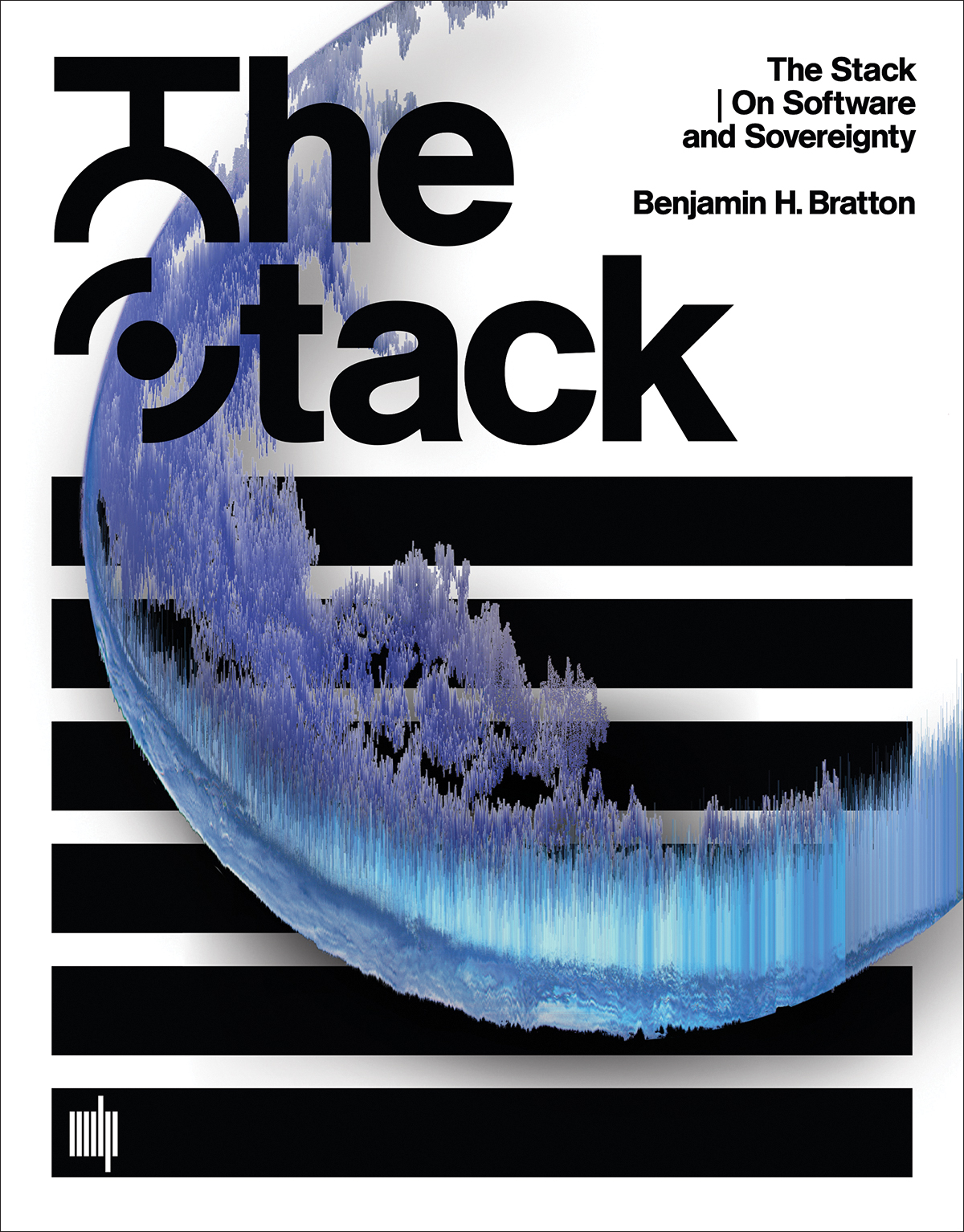Benjamin H. Bratton: The Stack: On Software and Sovereignty (2016)
Filed under book | Tags: · architecture, automation, city, cloud computing, computation, earth, geopolitics, infrastructure, interface, internet of things, software, software studies, technology, theory

“What has planetary-scale computation done to our geopolitical realities? It takes different forms at different scales—from energy and mineral sourcing and subterranean cloud infrastructure to urban software and massive universal addressing systems; from interfaces drawn by the augmentation of the hand and eye to users identified by self—quantification and the arrival of legions of sensors, algorithms, and robots. Together, how do these distort and deform modern political geographies and produce new territories in their own image?
In The Stack, Benjamin Bratton proposes that these different genres of computation—smart grids, cloud platforms, mobile apps, smart cities, the Internet of Things, automation—can be seen not as so many species evolving on their own, but as forming a coherent whole: an accidental megastructure called The Stack that is both a computational apparatus and a new governing architecture. We are inside The Stack and it is inside of us.
In an account that is both theoretical and technical, drawing on political philosophy, architectural theory, and software studies, Bratton explores six layers of The Stack: Earth, Cloud, City, Address, Interface, User. Each is mapped on its own terms and understood as a component within the larger whole built from hard and soft systems intermingling—not only computational forms but also social, human, and physical forces. This model, informed by the logic of the multilayered structure of protocol “stacks,” in which network technologies operate within a modular and vertical order, offers a comprehensive image of our emerging infrastructure and a platform for its ongoing reinvention.
The Stack is an interdisciplinary design brief for a new geopolitics that works with and for planetary-scale computation. Interweaving the continental, urban, and perceptual scales, it shows how we can better build, dwell within, communicate with, and govern our worlds.”
Publisher MIT Press, 2016
Software Studies series
ISBN 9780262029575, 026202957X
xx+502 pages
Reviews: Mercedes Bunz (Media Culture Society, 2016), Roger Whitson (2016), Marc Tuters (Computational Culture, 2017).
Commentary: McKenzie Wark (Public Seminar, 2016), Lukáš Likavčan (Hong Kong Review of Books, 2017; Artalk, CZ).
ARPA Journal, 4: Instruments of Service (2016)
Filed under journal | Tags: · architecture, city, design, design research, infrastructure, research, urbanism

ARPA Journal is a biannual digital publication that serves as a public forum for debate on applied research practices in architecture.
This issue questions the status of the instrument and of service. The articles explore spaces of encounter between “tangible and intangible creative work” in design practice, business models, new forms of representation and activism.
With contributions by Denise Scott Brown, Orit Halpern, Curt Gambetta, Alan Smart, Annabel Wharton, Francesca Hughes, Magdalena Miłosz, Filip, Wendy W Fok, J. Meejin Yoon and Eric Howeler, Michelle Fornabai, Ryan John King and Ekaterina Zavyalova, Lori Brown, Mustafa Faruki, Behnaz Farahi, Anab Jain, Jonathan Sun and Carlo Ratti, McLain Clutter, and Rafi Segal.
Guest Editor: Jennifer W. Leung
Based at Columbia University Graduate School of Architecture, Planning and Preservation, New York
Published May 2016
Open access
Beatriz Colomina (ed.): Sexuality & Space (1992)
Filed under book | Tags: · architecture, body, city, feminism, gender, sexuality, space

The first book-length publication dedicated to a comprehensive discourse on sexual identity within the discipline of architecture. Based on a symposium held at Princeton University School of Architecture in March 1990.
Publisher Princeton Architectural Press, New York, 1992
ISBN 1878271083, 9781878271082
389 pages
via Dubravka
Reviews: Elizabeth Wilson (Harvard Design M 1997), Nadir Lahiji & D.S. Friedman (AA Files 1999).
Commentary: Samuel Ray Jacobson (master’s thesis, 2013).
PDF (9 MB)
Comment (0)
